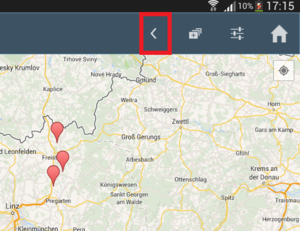Difference between revisions of "HowTo:Use POI Groups"
| Line 3: | Line 3: | ||
== Map view == | == Map view == | ||
=== View POI groups === | === View POI groups === | ||
| + | [[File:Dialog_box.png|thumb|alt=Map dialog box|Map dialog box]] | ||
| + | [[File:Navigate_back_button.png|thumb|alt=Navigate back to parent POI group|Navigate back to parent POI group]] | ||
# click on POI group icon on the map, to choose a POI group. | # click on POI group icon on the map, to choose a POI group. | ||
# To navigate to the children POI groups and POI group items of current POI group, choose open Group from the displayed dialog box. | # To navigate to the children POI groups and POI group items of current POI group, choose open Group from the displayed dialog box. | ||
Revision as of 15:26, 28 April 2014
POI groups are groups of Points of Interests (POI). The groups initially are represented as single objects, hiding their contents initially. Once a group is selected, the contents become visible. POI groups are represented in both Map views and POI views.
Map view
View POI groups
- click on POI group icon on the map, to choose a POI group.
- To navigate to the children POI groups and POI group items of current POI group, choose open Group from the displayed dialog box.
- To navigate back to the parent view, click on the back button on the top map menu.
POI view
View POI groups
- click on POI group billboard on the POI view, to choose a POI group.
- To navigate to the children POI groups and POI group items of current POI group, choose open Group from the displayed dialog box.
- To navigate back to the parent view, click on the back button.


